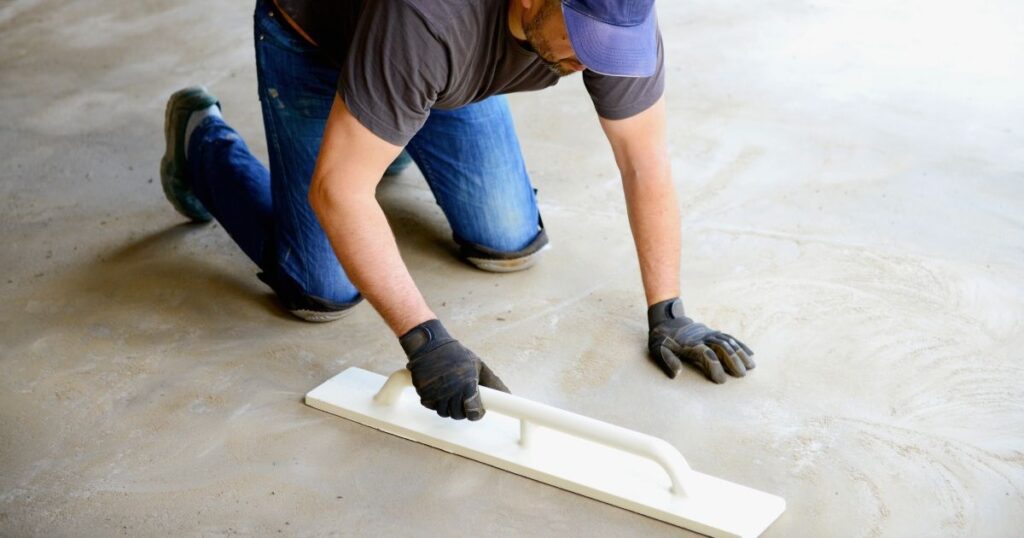
Concrete surfaces are renowned for their durability and versatility, making them popular choices for driveways, patios, industrial floors, and garage floors. To ensure their longevity and aesthetic appeal, homeowners must adhere to proper maintenance measures. This article provides valuable insights into maintaining and enhancing concrete surfaces, particularly focusing on the cleaning and care of epoxy-coated floors. Understanding the specific requirements of epoxy-coated surfaces, including industrial concrete coatings, and implementing practical recommendations can empower homeowners to ensure that their concrete spaces remain resilient, visually appealing, and capable of withstanding the rigors of daily use.
Gentle mopping: should be included in your epoxy-coated floor maintenance regimen to provide a complete cleaning. Use a pH-neutral cleanser mixed with warm water to protect the epoxy finish from potential harm. Avoiding harsh chemicals and acidic cleaners is critical since these substances can degrade the coating, reducing its shine and resilience over time. The use of a microfiber mop is critical in this operation, as it ensures excellent cleaning without leaving lint or scratches, preserving the perfect appearance of the epoxy-coated surface and extending its longevity and aesthetic appeal.
Regular Cleaning Routine: Maintaining the allure of epoxy-coated floors requires the implementation of a constant cleaning practice. Weekly sweeping or vacuuming is critical to preventing the accumulation of dirt and debris, which can eventually scratch the epoxy coating. This task is best accomplished with a soft-bristle broom or a vacuum with a gentle brush attachment. This procedure not only protects the epoxy finish from harm, but also maintains its life. By incorporating this regular cleaning practice, homeowners can proactively preserve the perfect state of their epoxy-coated surfaces, so increasing both the visual appeal and durability of these popular flooring options.
Understanding Epoxy-Coated Floors: The increasing popularity of epoxy-coated concrete floors can be due to their exceptional durability, stain resistance, and smooth appearance. Whether gracing garages or indoor areas, these surfaces require specialized upkeep to maintain their sparkling attractiveness. To handle the special needs of epoxy-coated flooring, homeowners can learn practical cleaning and improvement techniques. This necessitates a specialized approach to preserving not only the structural integrity but also the visual attractiveness of these surfaces, resulting in a durable and aesthetically pleasing option for a variety of locations within a house.
How To Clean Epoxy Garage Floors
Garage flooring are especially prone to oil, grease, and other tough stains. To keep your epoxy garage floor clean, use the following steps:
Immediate Spill Cleanup: Clean up spills as soon as they occur to prevent them from seeping into the surface. To soak up liquids, use an absorbent material such as kitty litter, then clean gently with a soft towel.
Mild Detergent Solution: When it comes to removing persistent grease or oil stains from epoxy garage flooring, using a mild detergent solution is an extremely successful method. By combining a mild detergent and warm water, you can make a soapy solution that gently but effectively removes these tough stains. To cleanse the afflicted areas, use a soft brush or mop to ensure complete coverage. Following this, a thorough rinse is required to remove any remaining detergent and prevent residue accumulation. This procedure not only removes individual stains but also maintains the overall cleanliness and beauty of the epoxy-coated garage floor, increasing its longevity and aesthetic appeal.
Non-Abrasive Cleaners: Choosing non-abrasive cleansers is critical to maintaining the integrity of your epoxy garage floor. It is critical to use mild cleaning solutions because abrasive cleaners have the potential to harm the surface, endangering the durability of the epoxy coating. These minuscule scratches may reduce the overall durability and cosmetic appeal of the flooring over time. Prioritizing non-abrasive choices ensures effective cleaning without creating unintended damage. By using cleaners that are specifically designed for use on epoxy surfaces, homeowners can securely maintain the pristine state of their garage floors, extending the life of the epoxy coating and maintaining its resilience to wear and strain.
How To Remove Epoxy From Concrete
Epoxy coatings can deteriorate or get damaged over time, necessitating their removal and reapplication. Here’s how to safely remove epoxy from concrete:
Heat Application:
Heat application is an effective way for removing epoxy from concrete surfaces. Using a heat gun or propane torch, the epoxy is softened, making it easier to remove. Next, use a putty knife or floor scraper to gently scrape off the softened epoxy. To avoid damaging the underlying concrete, proceed with caution during this operation. This method is especially successful for removing difficult epoxy coatings, offering a controlled and efficient approach to restoration. With care and accuracy, homeowners can successfully revitalize their concrete surfaces without jeopardizing the substrate’s structural integrity.
Chemical Strippers:
Chemical strippers, which are widely accessible at hardware stores, are an effective method for removing epoxy. Epoxy paint strippers that have been specifically developed break degrade the epoxy coating, making it easier to remove later. However, caution is advised, and strictly following the manufacturer’s recommendations is essential. When employing chemical strippers, gloves and goggles are required to avoid skin and eye discomfort. Following established safety measures guarantees a safe and effective epoxy removal process, allowing homeowners to restore their concrete surfaces without jeopardizing human safety or the integrity of the underlying substrate.
Grinding or Sanding:
When heat and chemical strippers fail to remove epoxy, mechanical procedures such as grinding or sanding must be used. This more extreme procedure entails mechanically abrading the epoxy covering from the concrete surface. Careful execution is required to avoid excessive concrete removal, which could jeopardize the structural integrity of the floor. Grinding or sanding is a potent cure for tough epoxy, but it takes careful balance to ensure effective removal without inflicting unexpected harm. To prevent any traps in this process, homeowners should exercise caution and seek professional advice as needed.
Protective Measures
Prevention is frequently the best technique for keeping epoxy-coated concrete surfaces. Implementing preventative measures can go a long way towards preserving the integrity of the covering.
- Furniture Pads: Place felt or rubber pads under furniture legs to protect the epoxy surface from scratches or gouging.
- Mats and Rugs: Use entrance mats to catch dirt and debris before it gets to the epoxy-coated flooring. Rugs can provide additional protection in high-traffic areas.
- Avoiding Harsh Chemicals: Harsh chemicals, such as ammonia or citrus, might damage the epoxy coating. If in doubt, refer to the manufacturer’s recommendations for cleaning products.
Conclusion
Maintaining and improving concrete surfaces, particularly epoxy-coated floors, involves a combination of routine cleaning, sensitive care, and preventative precautions. Homeowners can ensure that their concrete surfaces are both aesthetically beautiful and lasting for years to come by learning how to clean epoxy floors, including epoxy garage floors, and addressing issues such as epoxy removal when needed. With these practical tips, your concrete floors will continue to gleam and stand the test of time. Look for an Basement and Garage epoxy flooring near me and get going.


 Ensuring the Safety of Your Wisconsin Home’s Roof: When to Consult a Roofing Expert
Ensuring the Safety of Your Wisconsin Home’s Roof: When to Consult a Roofing Expert  Enhance Your Comfort with Premier Gas Water Heater Installations in Red Wing, Minnesota
Enhance Your Comfort with Premier Gas Water Heater Installations in Red Wing, Minnesota  Creating Inviting Outdoor Spaces: The Benefits of Outdoor Fireplaces in the Twin Cities
Creating Inviting Outdoor Spaces: The Benefits of Outdoor Fireplaces in the Twin Cities  Why Are Real Estate Serviced Apartments An Ideal Investment?
Why Are Real Estate Serviced Apartments An Ideal Investment?  How a Solar Company Designs Custom Solutions for Your Home
How a Solar Company Designs Custom Solutions for Your Home  Creative Uses of LED Strip Lighting for Accent Lighting
Creative Uses of LED Strip Lighting for Accent Lighting  The Benefits of a Fire Pit for Year-Round Outdoor Living
The Benefits of a Fire Pit for Year-Round Outdoor Living  The Role of Minimalist Lighting in Modern Interior Design: Trends and Functional Analysis
The Role of Minimalist Lighting in Modern Interior Design: Trends and Functional Analysis  Top Security Features to Look for in a Garage Door
Top Security Features to Look for in a Garage Door  Comprehensive Guide to Mold Removal in Hunterdon County: Safeguarding Your Home and Health
Comprehensive Guide to Mold Removal in Hunterdon County: Safeguarding Your Home and Health